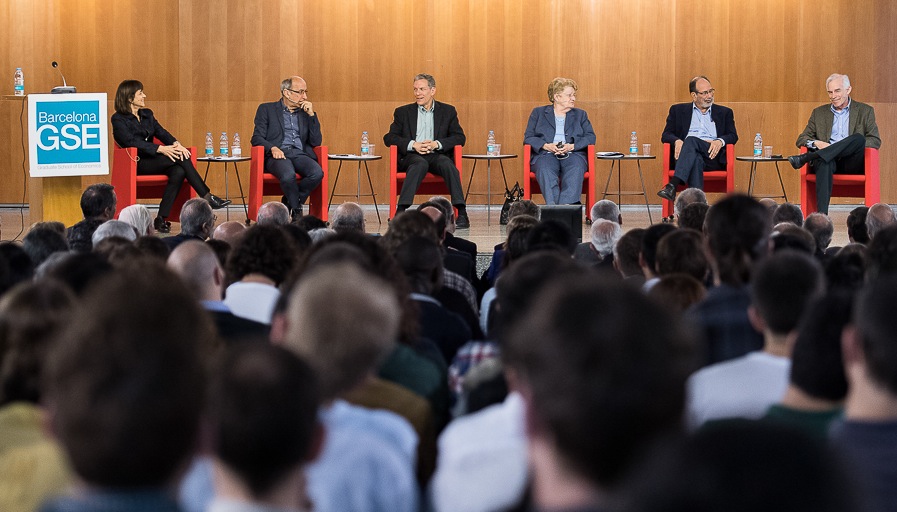
On Friday, 31 March, the BGSE played host to a number of Nobel laureates and other leading academics from around the world as part of its 10th Anniversary Celebrations. The first event of the weekend was a roundtable discussion with five eminent academic guests about “The Practical Influence of Economic Research”. This post highlights some of the main points to come out of the contributions of the first three speakers: Prof. Richard Blundell, Prof. Matthew Jackson and Prof. Anne Krueger.
Prof. Richard Blundell, University College London
 With the help of attendant BGSE staff, Prof. Blundell overcame a minor hiccup with his microphone to speak on the practical influence of his research in the microeconomics of public policy and tax reform, and argued that the evidence economists present can have an important impact on government policy. As an example, he referred to the Mirrlees Review, which was produced under the auspices of the UK’s Institute for Fiscal Studies (IFS), and published in 2011, with the aim to “identify the characteristics of a good tax system for any open developed economy in the 21st century, assess the extent to which the UK tax system conforms to these ideals, and recommend how it might realistically be reformed in that direction.”
With the help of attendant BGSE staff, Prof. Blundell overcame a minor hiccup with his microphone to speak on the practical influence of his research in the microeconomics of public policy and tax reform, and argued that the evidence economists present can have an important impact on government policy. As an example, he referred to the Mirrlees Review, which was produced under the auspices of the UK’s Institute for Fiscal Studies (IFS), and published in 2011, with the aim to “identify the characteristics of a good tax system for any open developed economy in the 21st century, assess the extent to which the UK tax system conforms to these ideals, and recommend how it might realistically be reformed in that direction.”
According to Prof. Blundell, the Mirrlees Review has been successful in identifying flaws in the UK tax system (and those of other countries), such as effective marginal tax rates that decrease over certain ranges of income levels, and that differ across different sources of income, such as earned income, self-employment income and dividend income. Tax benefits for low-income members of the population also tend to be unnecessarily complex and difficult to understand. These aspects of developed economies’ tax systems carry particular weight in the context of increased inequality and decreasing incomes at the lower end of the income distribution.
Prof. Blundell also argued that the Mirrlees Review has had some success in addressing these flaws, referring to the fact that a number of UK lawmakers have accepted some of its core proposals, and that the Review has been widely translated and distributed around the world.
Prof. Matthew O. Jackson, Stanford University
 Prof. Jackson started his presentation with a question that would be referred to a number of times by other speakers in the contributions that followed: what is (and what should be) the role of economists in society? Prominent economists have offered different definitions of their role since the inception of the field, variously likening the profession to those of artists, ethicists, story-tellers, scientists, engineers and, most recently, plumbers. Prof. Jackson focused mainly on the contrasting characterisation of economics as story-telling (as propounded by Robert Lucas) or as a science.
Prof. Jackson started his presentation with a question that would be referred to a number of times by other speakers in the contributions that followed: what is (and what should be) the role of economists in society? Prominent economists have offered different definitions of their role since the inception of the field, variously likening the profession to those of artists, ethicists, story-tellers, scientists, engineers and, most recently, plumbers. Prof. Jackson focused mainly on the contrasting characterisation of economics as story-telling (as propounded by Robert Lucas) or as a science.
According to the story-telling view, economists deliberately work in an “unrealistic”, simplified world in order to tell us useful things about the real world using the power of imagination and ideas. In contrast, seeing economists as scientists doing the same kind of work as, for example, physicists, would imply that economists are engaged in discovering universally applicable laws of how markets work, and how firms and consumers make decisions. Ultimately Prof. Jackson highlighted how many of the most exciting recent advances in economics appear to fit better with the characterisation of economists as engineers or plumbers, such as recent developments in market design and development policy.
Prof. Jackson concluded by pointing out the potential practical implications of his own research on economic and social networks, and how modern technological tools can help us to better understand such networks. As an example, he referred to a figure produced using Python, showing how the US Senate had become more partisan over time, by drawing connections between senators that voted for the same legislation across party lines, and illustrating how the number of connections between Democrats and Republicans had declined over time.
Prof. Anne Krueger, The Johns Hopkins University
Prof. Krueger hi ghlighted two ways in which economists exercise practical influence, namely by providing evidence that influences policy, and by providing blueprints to follow when change happens too fast for appropriate evidence to be gathered.
ghlighted two ways in which economists exercise practical influence, namely by providing evidence that influences policy, and by providing blueprints to follow when change happens too fast for appropriate evidence to be gathered.
Regarding the former avenue of influence, Prof. Krueger’s points were in line with those made by Prof. Blundell. Her most important example was India’s use of a small scale industry (SSI) reservation policy for more than 60 years, through which the Indian government reserved the production of certain goods to firms that employed fewer than a specific threshold of employees. Economists ultimately produced convincing evidence that this policy was not allowing firms in the reservation industries to exploit economies of scale, thereby rendering them uncompetitive relative to producers of the same goods in other countries. According to Prof. Krueger, this economic evidence helped to convince the Indian government to scale back and ultimately do away with its SSI reservation policy, to the benefit of Indian businesses in the affected industries.
Prof. Krueger made a similar argument concerning the cost of protecting employment through the use of import constraints, and referred to an example in the US where the costs of higher prices to consumers of import protection were many multiples greater than the employment income saved through that protection. Prof. Krueger argued that by attaching figures to these costs in dollar terms, economists could influence lawmakers to adopt better policies.
Finally, Prof. Krueger referred to the 2008 financial crisis as an instance where economists had formulated a blueprint for responding to a rapidly changing situation, partly based on research on the Great Depression. Prof Krueger argued that this blueprint, which among other things called for large monetary and fiscal stimulus, had probably prevented a more serious recession following the crisis. As a further example, she mentioned the Mexican sovereign debt crisis of 1982, and argued that the structural reforms proposed by economists as a blueprint following the crisis have helped Mexico to achieve a better economic position than it otherwise may have done.
Continue with Part 2, which covers presentations by Prof. Alan Roth and Prof. Christopher Sims
